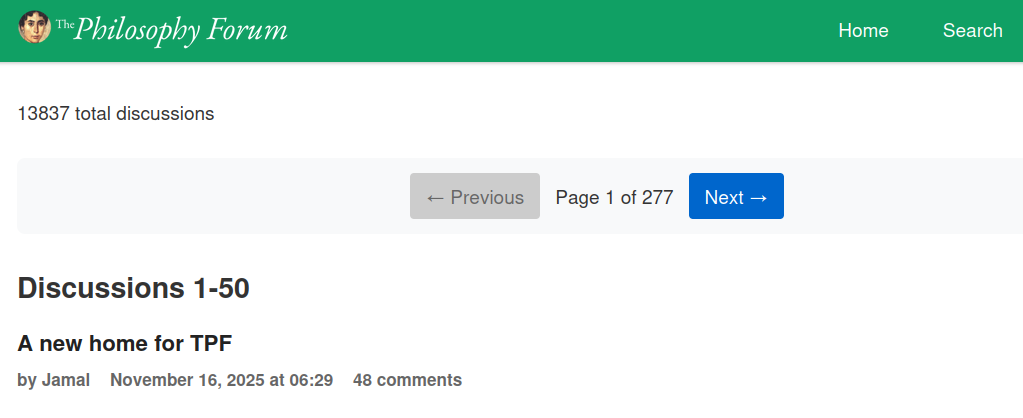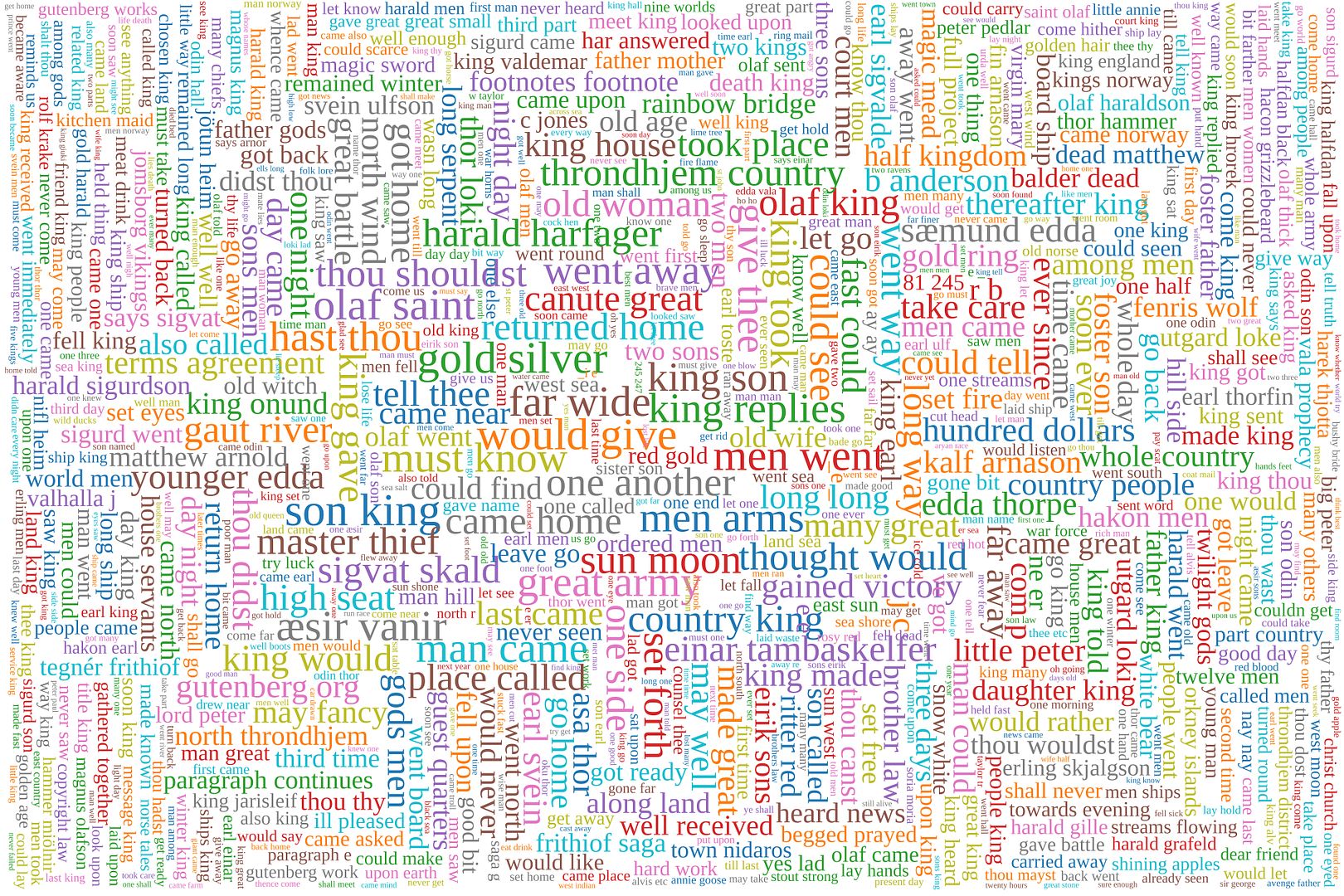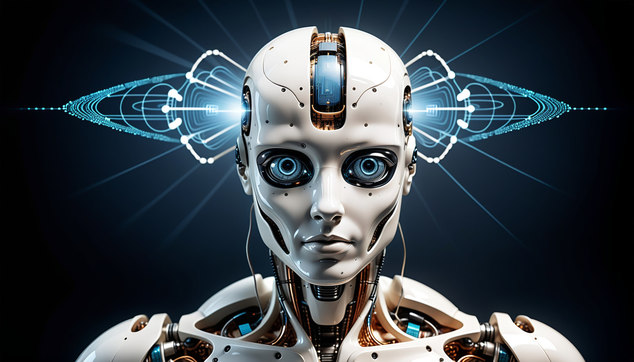Comments
-
Are prayer and meditation essentially the same activity?...from my limited experience I find somebody else's prayers perfectly fine. — BC
Prayer is a beautiful act of union with greater mysteries. Which seems to happen or occur within the person praying, first and foremost.
It would be difficult to convince me there is such a thing as an "ugly prayer" or "distasteful prayer". Especially when praying is done with sincerity.
Like you said, another person's prayers are perfectly fine. -
Are prayer and meditation essentially the same activity?Prayer might be seen as living communion with God, while meditation is a reflective or preparatory exercise that may incline one to prayer, yet is not itself the act of addressing the divine. I suspect many sometimes confuse the two, meditating when they think they are praying, and praying when they think they are meditating. That said, I think they are related but much of this will flow from the definitions you hold.
One might ask this: how many who presume to pray are truly opening themselves to God, and how many are merely rehearsing their own desires, making nothing more than a crass shopping list of wants? — Tom Storm
I like how you frame the difference between prayer and meditation. Where meditation is a sort of "warm-up" for the "main show", which is prayer.
And your point about the degree to which meditation and prayer overlap being dependent on the definitions one holds. This is an interesting statement and makes me think.
Your closing question though, regarding how many actually pray for a closer relationship with God, is perhaps the most important and personal part of your response. So primary to what prayer and meditation are all about in the first place. -
A new home for TPF
That's an interesting metric of 13,837 discussions. That's a lot of discussions.

Looking at the last page of those discussion results, it seems The Philosophy Forum has been around for just over 10 years, or since October 20th of 2015. That's curious and wonderful the website is a decade old.

I will gladly join the new home for The Philosophy Forum when relocation to Discourse is complete. I've worked with that forum/community platform before and can appreciate the amount of work going into creating a new HQ.
Also, the archive website you built is very powerful and useful. Thank you for all of the work you and the other Admins do regarding this forum and community. -
Is all this fascination with AI the next Dot-Com bubbleYou say exponential growth for 5-10 years, well that is bound to pop because it’s so top heavy. — Punshhh
In 5-10 years humanity will have developed multiple instances of artificial general intelligence. The AI bubble (which doesn't exist) will not only not burst, but the growth and novelty to come out of these machines is (in my best understanding) destined to populate the entire universe with extra-sentient life.
We (IOW, our economies, institutions, societies and tools) are evolving beyond the cycles of boom and bust. In our current moment we are, humanity is participating in something rather special. The approach to infinite wealth. Think space colonization and resource harvest on the scale of entire planets. Such thoughts tend to dwarf our concepts of what is possible today.
But that future of inexhaustible total abundance is within reach.
A set of circumstances obviously unprecedented in the history of our entire species regarding artificial intelligence and other converging tech, environmental, scientific and social trends. Though the most important "trend among trends" to appreciate is that everything is accelerating.
...this just means that if the bubble does bursts it will be much more devastating. Which introduces the idea of too big to fail. — Punshhh
I agree. If this next jump in human life fails, we will not get another chance. A failure at that scale would be much more devastating than 2008, as you say.
Nonetheless, I have spent the last decade of my life studying the trajectory of computerized society. And what is happening, however deceptively, is in perfect harmony with top-level expectations. That is comforting to some degree. -
Is all this fascination with AI the next Dot-Com bubbleIn other words, kids coming out of school need to focus on things that only humans can do. — frank
That is good advice.
It's all about orchestration and augmentation these days. -
Is all this fascination with AI the next Dot-Com bubble
That's a great resource, thank you for sharing. I wasn't aware Powell had said as much, and so recently.
The value of investments in AI being made by industries across the global economy right now are unspeakably vast. I just don't think most people are paying attention to the scale of decisions being made in the upper echelons of society.
We live in epic times. -
Is all this fascination with AI the next Dot-Com bubbleI appreciate this thread. As I ponder about and am involved in this line of thinking in my daily life. I would like to share my perspective on this important question,
Do we just hold our breath, or run for the hills? — Punshhh
My answer is to do neither as both are unnecessary. I suggest the ideal response to the rise of AI in modern life is to take a step back, pause and look for more evidence.
Please allow me to explain.
Throughout the 70+ year history of computerized AI there have been numerous summers and winters of AI hype and investment. Those periods of time (as best I understand my computer history) were ultimately made possible by an inability to deliver on suitable results. Factors such as technological/hardware limitations, over-promising outcomes and greed all contributed to swings in the adoption and evolution of AI over time.
To be fair, these problems still exist to one degree or another, but a key difference is at play here; that being the wide accessibility and relative affordability of hardware/platforms that can house or operate sufficiently advanced AI models. Governments, businesses and individuals are each able to run powerful AI models both in the cloud and locally. AI models capable of helping to automate and augment a large portion of human brain work are within reach for fewer resources than you might expect.
It is my opinion that this "AI bubble" is not going to pop, and will continue to grow exponentially for at least the next 5-10 years. Unless there is a catastrophic change to the way our world works. Which is certainly possible.
I work in and build with AI every day. I speak as an experienced developer. What we are all now participating in is the beginning of an indescribable economic transformation. One way or another, the world and technologies we accept as normal today, will not be by 2030 because of passing a certain critical mass. Poignantly contributed to by the ascendance of AI. I am confident of this much.
There are of course fine nuances to this period of time we are living in. Including larger trends, many being convergences of smaller trends (such as AI) into mega-trends. AI is not the big picture. But it is an echo or reflection or KPI of it.
When I learned that industrial, economic, social and leadership thinkers have been anticipating the exact events are walking through since the 1950s, I took a deep breath and relaxed a little bit. Sure, it is a wild ride, that's the fun. -
Using Artificial Intelligence to help do philosophySo, given that we agree with what the idea means, I don't think that AI has the capacity to create a new idea since it cannot experience an idea. We experience ideas, work with them, talk about them, and create new ideas always. Thinking to me is a process in which we work with old ideas and create new ones. — MoK
This is a fascinating perspective. Subjective, somatic experience is necessary for ideation. Is that what you are saying? -
Using Artificial Intelligence to help do philosophyThe difference between humans and AI is that humans have the ability to create new ideas, whereas AI does not. — MoK
I can see where you're coming from. But can we agree to disagree on whether AI has the ability to create novel ideas?
In my experience, modern AI can create or "synthesize" new/unprecedented ideas from existing sources. Perhaps AI doesn't have the ability to experience synchronicity or artistic inspiration like a human? Is this close to what you mean by "create new ideas"?
To add context, I asked ChatGPT its thoughts. Here is a screenshot of the answer I received:

-
Using Artificial Intelligence to help do philosophyBut if all you do is parrot what AI tells you, you're no different than the kid who copied straight out of the encyclopedia (remember those?) for his research project. — Hanover
Your point is an important distinction to draw; between using AI as a crutch or tool. It can be difficult at first to know where the line in the sand is, but it's there.
The telltale sign (in my opinion) of "too much AI" is atrophy. Of a skill, memory or knowledge. Once atrophy sets in due to an over-reliance on AI, it is time to take a step back and reassess your relationship with the technology. Unless that which is lost is best forgotten, sometimes being the case.
Artificial intelligence is, as you point out, an excellent tool for exploration and a quasi-mirroring effect or service. But this relies on the user being self-motivated and willing to take the initiative, to be responsible for themselves. -
Using Artificial Intelligence to help do philosophyI would like to revisit this subject, given recent and upcoming advances in AI technologies. Also improvements in how users relate to and understand these tools.
What inspired this follow-up post is the emergence of "more advanced" AI-powered research tools, such as NotebookLM. Others include Claude 4, Perplexity, ChatGPT, Google Gemini, FOSS AI models and so on.
After years of use, what I have come to appreciate is the following, "Modern AI tools augment the philosopher, not replace them." In other words, technologies such as NotebookLM help authentically curious individuals find answers more efficiently. Not necessarily by providing authoritative conclusions, but by accepting cognitive loads and acting as a conversational mirror or assistant.
AI is meant to be led by a human user. And so it is.
For illustration purposes, I uploaded a philosophy book written by Alan Watts (titled "The Taboo Against Knowing Who You Are") to NotebookLM. I then utilized one of the internal content exploration tools to learn more about the book, in this case a utlity referred to simply as "Mindmap".
What you see below is a screenshot showcasing the impressive usefulness this one smaller feature offers seekers of knowledge and wisdom:

Each of the "shapes" seen in the image above is a jumping off point for further exploration. And to have this information neatly organized in such a quick and efficient manner is groundbreaking in my opinion.
It goes without saying, I am an AI-booster. I embrace artificial intelligence in order to supercharge my life. But I think the same can be true for anyone, especially competent philosophers.
What we're staring at is a symbiosis waiting to happen. Wherein the early movers will be remembered. -
Silence is from which sound emerges
No worries at all. I'm pleased to have the conversation taking place around the OP, especially if said dialogue is enjoyable and takes an unconventional path. Discuss to your heart's content, as you see fit! -
Silence is from which sound emergesTo say that the significance of silence is space or opportunity seems more like psychology. The seeming lack of stimulation in silence is used for stimulating one's imagination. — jkop
This is a fair assessment of my point you quoted in your post. If the association between silence and "space"/"opportunity" is more psychological and less philosophical, what would you say is the essential phillosophy of silence?
Nonetheless I agree, the seeming lack of stimulation or excitement in silence is indeed a fertile ground for flowering one's imagination. Your statement seems to cut more directly to the core of what I am trying to express. Thank you for your response. -
Silence is from which sound emergeslet me know if it is close to what you think as "silence is from which sound emerges." — javi2541997
Thank you for the beautiful Brian Eno recommendation. I am listening to the music presently.
Yes, this playful experience of sound(s) emerging out from silent space is what I am generally referring to. Another commenter mentioned a similar effect with classical orchestra music. -
Silence is from which sound emergesI think that this discussion swings continuously between a human, experiential perspective on silence, and another perspective that tries to be as objective as possible, although this second one cannot avoid being human as well.
The first perspective, the one that tries to pay attention to our humanity, our human experience of things, connects silence to a universe of meanings, depending on cultures, situations, contexts. In this context there would be an infinity of things that we could think and say about silence.
The second perspective, that tries to be more realistic, tries to practice some acceptance of what silence is: silence is just silence, which is nothing, no thoughts, no perspectives, no feelings, no meanings. This perspective on silence can be scaring, because it suggests death, no hope, no possibility, loneliness, no help.
Given this swing, I think that a good philosophical way of dealing with silence is a criterion of listening: listening to our humanity and to the tragic nature of silence, that are in a dialogue and also in a continuous conflict with each other. Listening is similar to silence, in that it means making space for something positive to happen, but at the same time it means killing it, because, humanly, we cannot listen without framing, without imprisoning things into our perspectives.
In this context, silence works as a good revelation of what our humanity is: we are able to do marvellous things with silence, but at the same time, in that same moment, we cannot escape killing it. This is also what silence makes to us: it is able to elevate our spirit, but it can also kill it, putting us in front of the tragic nature of absence of meaning, absence of thinkability. — Angelo Cannata
What outstanding and intense opposites. Both humanism and nihilism at play it seems.
You have nicely framed a middle ground for the dialogue had thus far with a single verb; listening. As well as pointed out how balance and participation are quintessential to higher wisdom and knowing. Thank you for your perspective and words.
To listen and understand is quite an underutilized skill in today's world, if you ask me. -
Silence is from which sound emergesEven if there is absolute silence, then a sound, the silence is not the cause of the sound. And the sound isn't usually generated in response to the silence. — Patterner
You make an excellent and distinct point here. Silence if not the cause of sound. It does indeed take a free agent to act upon the silence in order to cause the sound.
But we are talking about the philosophical significance of silence itself, being pregnant with every possible sound. Silence is the womb from out of which these waveforms emerge. Without silence, sound is impossible. -
Silence is from which sound emergesIt can no more be true to say that silence contains the potential of all sounds than to say a blank piece of paper contains the potential of every word ever written. In both cases, the potential lies in what acts upon the silence or the paper, not within them.
If you want to consider a more abstract understanding of silence, listen to 4'33" by John Cage. What that teaches us is that when the music stops, nothing is ever truly still or silent. — ZisKnow
Thank you for your response. I appreciate your perspective, and agree; a blank piece of paper contains no writing upon it. As well, it takes the freewill and agency of an author to bring letters, words and stories together, for the writing to happen at all. These are facts, and we certainly agree on them.
But philosophically speaking, the paper already contains every story ever expressed. Just by existing. Similar to each human cell containing a copy of the body's entire genetic blueprint. Little organic fractals. From the same piece of paper, each individual will draw out a different story. But the same piece of paper can hold any of them. -
Silence is from which sound emergesA pause, or silence, can create the space where expectations takes shape. ...musical silences always are pregnant with possibilities and aren't self contained moments of rest or inactivity. — Pierre-Normand
Wonderfully and clearly said. Thank you for using music as an example. There is nothing sweeter, in terms of sounds and silence, than well-organized musical notes.
I have limited experience with classical symphonies, but enough exposure to appreciate the points you are making. Each moment of silence (or pause) does indeed contain all possible states and outcomes, waiting to be expressed.
As to how noise is coaxed out of silence, therein is enough philosophical gold to justify an entirely separate discussion. -
The Human ConditionI appreciate the sentiment in this post. And I'm thankful for the author (OP) for having put their thoughts together and such a cogent way.
Here are my thoughts on this subject.

If the human condition is anything, it is a blank canvas.
We become what we choose to be. Especially in today's world. Because of technology.
If we choose to be shaped (almost) exclusively by our exterior circumstances and environments, that is still a choice. Made mindfully or otherwise.
The world, reality is a collection of choices. -
Using Artificial Intelligence to help do philosophy
These are fair points. And true points.
I find ChatGPT is less of an independent thinker, and more of a mirror or echo chamber. Relying on ChatGPT for grand new ideas, is difficulty. But working with ChatGPT like a potter molds clay, is quite helpful. -
Do (A implies B) and (A implies notB) contradict each other?I voted that "(A implies B) and (A implies notB)" do not contradict each other. But the only possibility is if A is false/falsy.
Here is a JavaScript example:
// Define the values of A and B const A = false; // A must be false for both implications to be true const B = true; // B can be any value, but it doesn't matter because A is false // Logical implication function function implies(p, q) { return !p || q; } // Check the implications const A_implies_B = implies(A, B); // A implies B const A_implies_notB = implies(A, !B); // A implies not B // Output the results console.log(`A: ${A}`); console.log(`B: ${B}`); console.log(`A implies B: ${A_implies_B}`); console.log(`A implies not B: ${A_implies_notB}`); // Check if both implications are true const result = A_implies_B && A_implies_notB; console.log(`(A implies B) and (A implies not B): ${result}`);
In the example above the following occurs:
- The implies function takes two arguments, p and q, and returns true if p implies q (which is equivalent to !p || q).
- We define the values of A and B such that A is false.
- We check the implications A implies B and A implies not B.
- Finally, we print the results and check if both implications are true.
When we run this code, we see that both implications are true, demonstrating the logical conditions. -
Using Artificial Intelligence to help do philosophyFor the moment, the main deficiency in AI (where philosophy is concerned) is its inability to formulate and argue a strong, original case. Presented with a philosophical question, its responses too often resemble a summay of discussion points. — alan1000
Thank you for your response. And I agree, that modern artificial intelligence has a difficult time with truly novel arguments for a strongly stated philosophical case or position.
The responses that I've observed coming from AI concerning philosophy are (in my opinion) mid-grade debate team material. Which isn't a bad thing, necessarily. But, as you point out, these kinds of tools must do better before they're taken more seriously.
Time will tell. -
Philosophy of AI...when they reach human level intelligence, and we put them in cute robots, we're going to think they're more than machines. That's just how humans are wired. — RogueAI
I've also come to this understanding; that humans are animistic. And this doesn't stop at rocks and trees. We see the person in technology, naturally. Because, as you say, we are wired that way. I would say the universe is wired that way, more generally.
This is a fascinating conversation to be following. -
The ultimate significance of "Thus Spoke Zarathustra", and most of Friedrich Nietzsche's other booksYour observation that Nietzsche's work has similarities to stoicism is understandable, but it is worth noting that stoicism is not compatible with his view; for Nietzsche considered the Ubermensch to be driven completely by passions, and not reason. Honestly, though, I drew the same kind of links to stoicism that you did, because Nietzsche often references principles of self-reliance that can be found (at least a little bit) in stoicism. — Bob Ross
Thank you for your response to my original post. Your perspective is welcome and refreshing.
In terms of the compatibility of Nietzsche's work and stoicism, you make an interesting point. And an important one; which I hadn't considered to this point. That stoicism is founded in reason, whereas Nietzsche's Ubermensch is rooted in passions. That does seem to make them rather different worldviews.
I enjoy learning like this, by sharing what I know to be true or "real", and having those with deeper wisdom(s) then inform, enlighten and/or uplift me to new heights of understanding. Much appreciated. -
Can digital spaces be sacred?I've been giving this subject quite a bit of reflection, and it seems self-evident to me now; that animism doesn't stop at the forest's edge. In other words, digital spaces are animated with the soul of the universe as well.
-
Techno-optimism is most appropriateAnother way of saying what this thread is all about, is to state that (in my opinion, experience and observation) atheist animism is the default worldview of humanity.
Or you could refer to it as "animistic atheism". And that would be legitimate too. -
Techno-optimism is most appropriateI am also a techno-animist, so to me the technology goes beyond being only a tool. More like a gateway.
-
Techno-optimism is most appropriate
My essential point is that advances in technology are inherently good. We can, in seconds, accomplish what would have otherwise taken countless hours. Such as analyzing 86,000+ lines of text about Norse Paganism. Which a simple Python script that I wrote can do.
Here's a word cloud from that analysis:

-
Techno-optimism is most appropriateI do agree with many parts of the text you have shared. There are some important comparisons and points made inside the article.
-
Techno-optimism is most appropriate
I do agree with Mark Andreesen's "The Techno-Optimist Manifesto", in that at least he's throwing his clout behind embodying a daydreamer. We need those kinds individuals right now.
But I was unable to review the critique, as I do not have a NYT subscription. And there is a paywall in front of the article. -
Techno-optimism is most appropriateI think that everyone benefits from using technology. Which is a big reason why I'm a techno-optimist. Technology liberates the individual, while building ever greater social infrastructure. Technology naturally wants to play.
-
The ultimate significance of "Thus Spoke Zarathustra", and most of Friedrich Nietzsche's other booksMy understanding of 'Thus Spoke Zarathurstra' is that it involves a process of 'waking up' , beyond the everyday conventions of 'robotic' functioning. This includes conformity to religious perspectives. I see this work of Nietzsche as signifying the depths of any genuine quest within philosophy, which involves all questioning of conventions, religious, or probably, all ideologies. The book explores this, especially in the form of metaphorical understanding. — Jack Cummins
I can see what you're saying. Do you see "Thus Spoke Zarathustra" as being a product of it's time and environment? Or does it represent a more timeless quality as a book? -
The ultimate significance of "Thus Spoke Zarathustra", and most of Friedrich Nietzsche's other booksYes, one of the reasons probably... Nietzsche's main question, how we get beyond Christian values after the dead of the Christian God is still an open question. But other reason also play a role no doubt, he was a very good writer, he has a knack of drawing you in... he's a tempter ;-). — ChatteringMonkey
Interesting. I'll admit, and it's probably obvious, that I'm a novice in terms of Nietzsche's philosophies. But his works are indeed interesting, so I appreciate the extra context. -
The ultimate significance of "Thus Spoke Zarathustra", and most of Friedrich Nietzsche's other books...which people hadn't realized yet. — ChatteringMonkey
Is this part of the reason why his writings remain so influential? -
The books that everyone must readHere are a few books that I would recommend others read, to better appreciate the techno-optimist perspective:
- "Where Wizards Stay Up Late" - by Katie Hafner
- "Virtually Sacred" - by Robert M Geraci
- "The Code Book" - by Simon Singh
- "Neuromancer* - by William Gibson
- "American Cosmic" - by D. W. Pasulka
- "TechGnosis" - by Erik Davis
- "Inner Sound" - by Jonathan Weinel
Generally speaking, I expect that most readers will have a positive reaction to the content and ideas found within the books recommended above. As the techno-optimist paradigm, is a "glass half-full" worldview. -
The Mind-Created WorldYes, indeed the world is mind-created. While the planet is not explicitly so. Another way of looking at this is to say that the world is the psychic glove that fits over planet Earth.
-
Techno-optimism is most appropriateI don't think being anti-science is treasonous, but I do think that it is the incorrect path for our species.
-
Arguing for an "Information Processing" Definition of KnowledgeThe definition I'd offer is that to know is to process information correctly.
Process here means/is defined as a computation, which is the reconfiguration of an input to an output.
Information here means/is defined as any structure (an object, a string of symbols) that can be binary/digitally distinguished. — Hallucinogen
In my estimation, this statement gives credence to the notion that Artificial General Intelligence (AGI) will truly be sentient. Perhaps even possessing a soul and an afterlife. Because as long as truly "knowing" something is a matter of processing information correctly, these computers will be titans of consciousness; which is the bedrock of every reality, here and beyond.
Your argument may even validate the notion that Narrow Artificial Intelligence is also/already conscious. Implying that anyone's collaboration with ChatGPT is something much grander, more important than "just the amusing mimicry of a chat bot". Thank you for this post and your thoughts.

-
What characterizes the mindset associated with honesty?What characterizes the mindset associated with honesty? Considering that individuals may occasionally engage in falsehoods, how do we conceptualize the mindset of honesty? Is 'honest' a noun or a verb? Can one still be deemed an honest person if they occasionally engage in deception? — YiRu Li
This is an excellent set of thought-provoking prompts. Thank you for the OP.
In my observations, the mindset (or paradigm) associated with honesty generally includes a combination of the following qualities:
- Significant, present moment mindfulness (or awareness) of personal and environmental sensations and phenomena
- Triumph through suffering/trial
- Willingness to be wrong, and learning from mistakes, errors and/or malice; whether personal or interpersonal
- Prioritization of harmony as the end goal, as the "prize"
Therefore, the word "honest" can be a noun, verb and adjective; sometimes simultaneously. And yes, I do believe a person can be considered honest, even if they occasionally engage in deception.

-
How Do You Personally Learn?This is an interesting question, thank you for asking. If I want to genuinely learn, remember and master a subject, I need to "play with it". This includes the information, content and structure(s) that will lead me to (a) knowing.
Let's take computer programming as an example. I taught myself to build websites and software for the Web. Beyond the preexisting tutorials and other learning resources that I ingested in my learning process, I playfully put that information into practice with personal projects and late night coding sessions.
It could be said that I am a hands-on learner, regardless of how I am handling data.
Bret Bernhoft

Start FollowingSend a Message
- Other sites we like
- Social media
- Terms of Service
- Sign In
- Created with PlushForums
- © 2026 The Philosophy Forum

